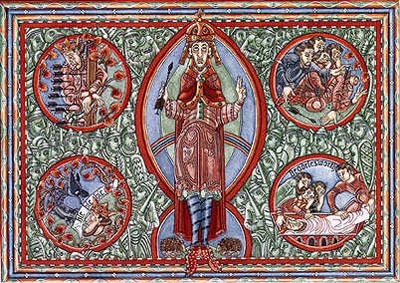His Father’s Son: A Short Story
“Knock, knock.”
Victor bit his tongue as he eased the door open a crack. He shouldn’t have said that. Trevor hated it when he said, “Knock, knock,” instead of actually tapping his knuckles against the doorframe. It didn’t really matter, though. Even when he knocked correctly, Trevor never answered.
But Victor knew he was in there. It was impossible to miss the wobbly smack of the screen door, the clatter up the stairs, the sturdier slam of the bedroom door. The Jacob’s Ladder in the corner was quietly zapping.
It never meant anything good when he turned on the Jacob’s Ladder.
Victor craned his head through the opening, and peered into the gloom. He could see the glossy black mop of Trevor’s hair cresting over the slouchy armchair that faced the window. God, he hated that sullen dye job–it looked like a pile of squid-ink pasta perched on his son’s head.
“Can we talk for a minute?” Victor asked, stepping over the jacket and backpack dumped on the floor.
“I s’pose,” mumbled the chair.
“I’m guessing you know what I want to talk about.”
“Prolly.”
“So? Can you explain what happened at school today? I mean, what were you thinking?”
“I dunno. Just made me mad, I guess.”
Victor gasped a slightly hysteric little laugh, and scrubbed his face with both palms. “He made you mad? That’s it? Son, lots of things are going to make you mad in life. You can’t go around breaking all their noses with cafeteria trays.”
Trevor gave a laugh in reply, lower and more fatalistic than his father’s. “I dunno,” he repeated. “Sure solved this one pretty well.”
“Well, that one kid might leave you alone from now on, but solving that one problem the way you did just brought down a whole host of other problems on all our heads. They’re talking suspension.”
“So?” Trevor asked insolently.
“So?” Victor echoed. “So there’s no way your mother and I are going to let you sit on your suspended butt at home alone all day while we’re at work! If we can’t trust you to behave at school, we sure as hell can’t trust you alone here, where there’s stuff you could really get in trouble with.”
That got a reaction. Trevor turned in the armchair, one eye appearing around the wing back, amid a straggle of black locks. “You mean your lab, don’t you.” He snorted. “Like I care about any of that.”
“You don’t have to care about it to make a mistake even I might not be able to fix,” Victor retorted quickly.
“No, I mean I don’t even care enough to go in there. And it’s not like you’ve done anything important in there for…what, now, like…sixteen years?”
Victor gritted his teeth. The kid always knew where to stick the knife. So he hadn’t started anything new in a while. Work, parenting, life–they all sapped his creative energy. He couldn’t even remember the last time he’d had enough left at the end of a day to even climb the attic stairs.
“That’s not the point,” he said, trying to regroup. “The point is, you’re not getting suspended.” He sighed, ran a hand through his already mussed hair. “You’re so different lately. You just…you don’t have the old spark anymore.”
“You should talk,” Trevor taunted softly.
“This isn’t about me! I mean, really, kid, what happened? When did life get so hopeless?”
The eye disappeared back around the side of the chair. Victor heard the shuffle of those ugly clodhoppers Trevor had taken to wearing. The thick black boots only made it more obvious that they couldn’t seem to get the boy pants that stayed long enough for more than a week. And those awful throwback suit jackets, with the shoulder pads and frayed cuffs. Who the hell decided these things were fashionable again? Victor grizzled to himself. They didn’t look good the first time around, and on a gawky teenager, they were downright monstrous.
Victor scrubbed his face with his hands again, and attempted a more sympathetic tone. “Was it that whole thing with Elizabeth this summer?”
“Like that was ever going to work,” Trevor spat bitterly. “I bet you and Shelley thought you’d created the perfect little couple.”
“Don’t call her Shelley,” Victor replied with more heat. “She’s the only mother you’ve ever known, and you’ll treat her with respect.”
An oppressive silence fell. Victor picked at the quilt covering Trevor’s bed, where he sat. The heavy boots thumped irregularly, from floor to chair to windowsill to floor again.
Then, just as suddenly as conversation had been extinguished, Trevor thrust himself out of the chair and into an uneven elliptical track of agitated pacing. “How could I even compete with him?” he demanded belligerently.
Victor’s head reeled as he tried to absorb the sudden shift. “Compete with who?” he asked, a bit desperately.
“With Henry, that’s who!”
“Is Henry the kid whose nose you broke today?”
No reply.
“Is he the one Elizabeth’s going out with now?”
Fuming silence, more clomping steps. Then, suddenly: “I mean, GOD, Dad, I’ve still got stitches! Nobody has stitches anymore!”
Victor felt the waters closing over his head. “What do they have, then?”
“Staples, Dad!” Trevor groaned with the despair of every teenager who ever wondered why their parents were hopelessly uncool. “Or at least clear poly thread! Man, the only other kid with black stitches is that exchange student from East Bee-Eff-istan.”
Victor held his tongue at Trevor’s swerve toward profanity, and took a few deep breaths. “So Elizabeth would like you better if you had staples?”
Trevor began worrying a hangnail with his teeth. “I dunno. At least I wouldn’t look like such a loser.” He sighed, stopped pacing. “And they keep bringing up that thing.”
“What thing?”
“The thing at Homecoming.”
“Oh. That thing.”
Trevor flopped down onto the bed, throwing an arm over his eyes in misery. “I’m never going to live that down.”
Victor scoffed gently, “That’s what everybody thinks in high school.”
“Dad. I screamed. Like a girl.”
“Everyone does, sometimes.”
“At a torch.”
“Well, it was really close to you. If I had as much junk in my hair as you do, I’d be afraid too.”
Trevor just moaned and rolled over, not even bothering to rise to the dig.
Victor moved to rub a hand down his son’s back, but hesitated. Instead, he gave the boy’s shoulder an awkward pat. “Look, Trev, if there’s one thing I’ve learned in life, it’s this: Life isn’t over, even when everyone else says it is.”
“It’s not the same as it was when you were young. There’s video, Dad. On YouTube. Something like 5,000 hits.”
“Yikes. That’s unfortunate.”
“Yeah, that’s one way of putting it,” Trevor sneered. “Here’s another one: I’m going to be the freak who screamed at fire until the day I die.”
Victor sighed. “If anyone knows what it’s like to carry around a reputation, it’s me, kid. I’ve been called a nerd. A freak. Out of my mind. And not even when I was in high school, where you can leave it behind someday.” He paused. “At least, not only in high school.” With a quick shake of the head, he refocused. “The point is, I know how it feels. It feels pretty lousy. But the truth is, everyone’s so worried about the kind of freak they are, they don’t have the brain power to worry about the kind of freak you are for long.”
“Great, thanks, Dad. You think I’m a freak too.”
“No, that’s what I’m trying to say! We’re all freaks!”
Trevor cried, outraged, “And you’re okay with that? You’re telling me I’m a horror show and I should just embrace it? What the hell kind of parenting is that?!”
“It’s the only kind I’ve got!” Victor shouted back. “It’s not a science, you know!”
“Maybe if it were science, you’d actually be good at it!”
Victor opened his mouth to yell a retort, then closed it abruptly. He rubbed the frown lines on his forehead. “Uh, thank you?” Trevor seemed equally startled by the compliment, if it was such a thing when given so impulsively and unconsciously. He fretted a loose thread on his sleeve as he searched for a reply.
The phone next to the bed jangled–not very loudly, but enough to startle them both. Trevor lifted the chunky old black handset. “Hullo?”
Victor watched as something like a conversation rolled out. If you could really call a series of false starts, nervous laughs, and mumbled sounds a conversation, he thought. I feel like I should be recording this for the anthropological record.
Trevor gave one last huffing laugh, then something that passed for a sign-off, and slowly returned the phone to its cradle. He looked a bit shellshocked, but slowly, a flush of color rose in his sallow complexion and a crooked sort of smile unfurled on his mouth.
Victor leaned in a little, nodding encouragingly. “So, was it her?”
“Yeah. Elizabeth.”
“And?”
Trevor swallowed hard enough to ripple the stitches on his throat. “And she wants to go out tomorrow. Someplace nice, she said. I guess Henry was pretty low-brow.”
“She dumped him? Even though you smacked him with the tray?”
“I guess it got back to her what he’d said about her before I hit him.”
Victor rolled his eyes. “You didn’t mention that part of the story, kid.”
Trevor shrugged. “Nobody at school asked why.”
“So where are you going to take her?” Victor prodded. “No candlelight dinners, I assume?” he teased.
Trevor gave a little laugh–small but real. “No, probably not. ‘S okay. She says she likes to look at the lake. I was thinking maybe a picnic.”
“Nice. Romantic. She’ll like that.” To himself, he muttered, “Good lord. Teenage dating. This’ll raise your mother’s hair.”
Trevor nodded absently, a far-away look in his eyes already. Victor reached out, shook his shoulder. “Come with me,” he blurted impulsively.
“Come with you where?”
“Upstairs. Just for a second.”
“Why?”
“Just come,” Victor urged, grabbing Trevor’s hand and tugging him off the bed. Together, they clattered down the hallway to the heavy metal door to the attic. Victor fumbled his keys until the lock turned with a disused wheeze. They squinted in the sudden darkness as they climbed the steep old-fashioned staircase, emerging into the cluttered space of Victor’s lab.
Trevor stood awkwardly, then poked at a dangling length of tubing. “What are we doing here, Dad?” he asked as his dad rushed around, flipping switches and tugging at rust-frozen latches. At last, Victor came to a stop beside a large metal crank extending from the wall, and all his frenetic energy transferred to forcing the bar along its circular track. “Come help with this! You’re young and strong!” Victor shouted.
Figuring that, if he was in for a penny, he might as well be in for a pound, Trevor clomped over to the crank, and settled his hands between his father’s. They’re the same size as mine, Victor noticed. A man’s hands, on my boy’s body.
They both flinched and blinked as sunlight suddenly speared through the widening crack in the roof. Victor coughed; Trevor sneezed. They broke the embrace they’d formed around the crank, but Victor hung onto Trevor’s hand and drew him over toward the raised wooden platform. “Here, pull this chain,” Victor urged him, rattling the clanking links impatiently.
As Trevor pulled, hand over hand, the platform rose toward the late afternoon sky. Only when they were level with the rooftree did it shudder to a stop. Victor planted his fists on his hips, his chest expanding with the rush of fresh air and freedom. He smiled, perhaps a bit manically, up at Trevor, who somehow looked even taller to him.
“Well?” Trevor asked. “Now what?”
“Now,” Victor said, “we do this.” He raised his arms over his head, provoking a squawk of alarm from a raven in the nearby tree, and yelled over the newer, shorter houses around their old Victorian mansion. “I’M ALIVE!” he bellowed, startling the rest of the ravens from the tree. “I’M ALIVE!”
Trevor gave a nervous laugh. “I’m not doing that.”
Victor plucked at his wrists again, urging Trevor’s arms upward. “No, really, there’s nothing quite like it. Just once, once for your old man. After all, I gave you life–that’s got to count for something.”



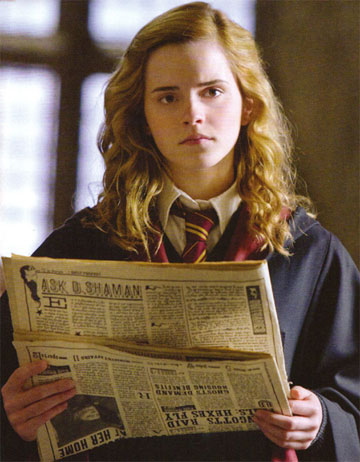 A big part of me is Hermione Granger. I’m a bossy know-it-all witch, always eager to share what I’ve learned with other people. That’s why I’m happiest when I’m teaching–all that reading and study is zero fun if I’m not sharing it with someone else. I’d rather spend my vacation in the restricted section of the library, and I’m a bit befuddled by how little attention most people seem to be paying to, well, everything. I’m pretty sure there’s no problem in the world that can’t be solved with more reading. I’m also fiercely loyal to those I love, and willing to go to the mat (or the troll, or the Shrieking Shack, or the Ministry of Magic) for them.
A big part of me is Hermione Granger. I’m a bossy know-it-all witch, always eager to share what I’ve learned with other people. That’s why I’m happiest when I’m teaching–all that reading and study is zero fun if I’m not sharing it with someone else. I’d rather spend my vacation in the restricted section of the library, and I’m a bit befuddled by how little attention most people seem to be paying to, well, everything. I’m pretty sure there’s no problem in the world that can’t be solved with more reading. I’m also fiercely loyal to those I love, and willing to go to the mat (or the troll, or the Shrieking Shack, or the Ministry of Magic) for them. But Hermione doesn’t cover my weird, unpredictable, impulsive side. For that, I turn to Delirium. She’s one of the Endless, a group of mythic archetypes that function as quasi-divinities/forces of nature in the classic graphic novel series The Sandman. Delirium hasn’t been quite right in the head since her brother Destruction, the big bluff protector of the bunch, split town. She wanders between her own reality and everyone else’s, and is fond of bizarre pronouncements and non sequiturs. At heart, though, she’s a little confused, a lot optimistic, and genuinely loves her family, imperfect though they are.
But Hermione doesn’t cover my weird, unpredictable, impulsive side. For that, I turn to Delirium. She’s one of the Endless, a group of mythic archetypes that function as quasi-divinities/forces of nature in the classic graphic novel series The Sandman. Delirium hasn’t been quite right in the head since her brother Destruction, the big bluff protector of the bunch, split town. She wanders between her own reality and everyone else’s, and is fond of bizarre pronouncements and non sequiturs. At heart, though, she’s a little confused, a lot optimistic, and genuinely loves her family, imperfect though they are.
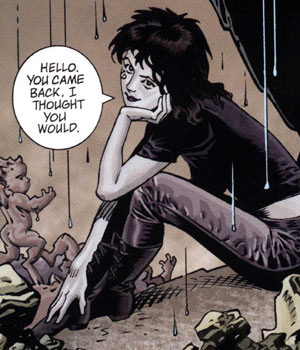

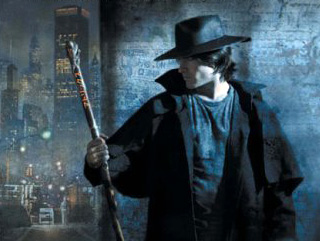

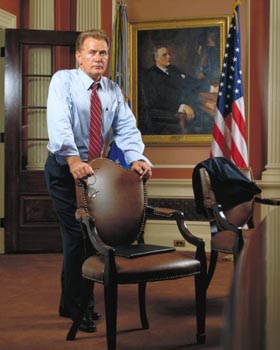




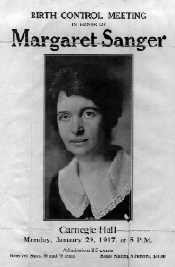
 Reviewers have widely panned the movie as a “
Reviewers have widely panned the movie as a “